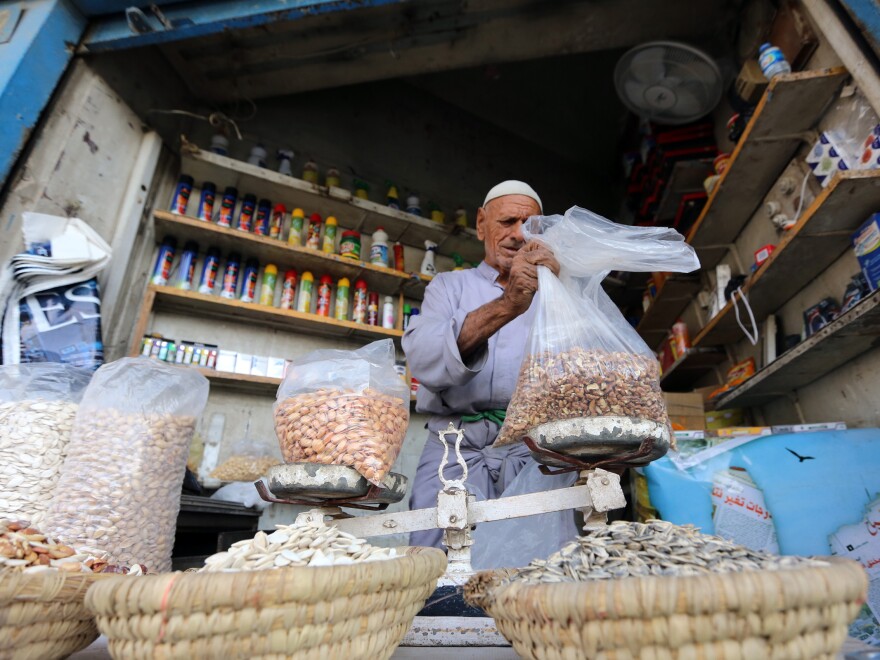With the current focus on Syria it's easy to miss that things are getting worse again in Iraq. Since the spring, the country has been pounded by waves of attacks on civilians and security forces by extremists with links to al-Qaida. Three car bombs in the Iraqi city of Baquba killed 10 people Tuesday.
Iraq is one of those slow-boil crises — not as dynamic or transformational as a military coup in Egypt or a civil war in Syria. Refugees aren't creating havoc on the borders. Iraq's government doesn't seem on the verge of falling. Instead, Iraqis are stuck in a middle ground: A daily life wracked with danger but without enough upheaval to raise international alarm.
That could change, however, if the bloodshed continues at current levels. U.S. troops withdrew in late 2011 but the country is still at the heart of important U.S. interests — oil, counterterrorism and regional stability amid the ongoing friction between Sunni and Shiite Muslims.
Statistics kept by the Baghdad bureau of Agence France-Presse show the monthly number of deaths jumping from between 200 and 300 at the start of the year to almost 900 in July and nearly 700 last month.
The count kept by the United Nations office in Iraq show higher totals with two or three times as many dying in the last couple months as were dying at the start of the year.
Last month, a U.S. State Department official said in a background briefing that suicide bombings had increased from five or 10 a month early in the year to about 30 a month now.

Those figures may not shock the international community when compared to the soaring death toll during the country's civil war in 2006 and 2007.
Back then, more than 2,500 people were killed some months. As U.S. troops prepared to withdraw and Americans lowered their goals for pacifying the country (along with their goals for most everything else), military officials would talk about trying to leave Iraq with a "tolerable" level of violence. That meant continued bombings and assassinations but not the kinds of things that tear countries apart: security forces fighting each other or a government collapse.
Holding Together — For Now
In a July article for ForeignPolicy.com, security analyst Douglas Ollivant said that despite the episodes of violence, "cooler heads" are prevailing and "the smart bet continues to be on Iraq holding together."
But Sunni extremists linked to al-Qaida have been emboldened by the chaos of civil war next door in Syria. In Syria now, they can find safe havens and a pipeline for new bombers through areas controlled by local Sunni allies.
Their targets in Iraq are largely in Baghdad and are usually Shiite Muslim areas. It looks like they're trying to provoke the kind of reaction by Shiite militias and government forces that set off the terrible strife in 2006. That's considered the tripwire to a larger sectarian conflict that would push more moderate Sunnis into a wider insurgency.
The extremists sometimes target security forces and Sunni moderates, tactics that can undermine sectarian co-existence. And Prime Minister Nouri al-Maliki's heavy-handed style, including the sweeping arrests of Sunni civilians and Sunni political figures, gives the Sunni minority a fear of oppression. Elections scheduled for next year are sure to heighten the tension.
The danger is that these factors could all be the fuel for a wider conflict.
"Given that it happened once, there's no reason to think it couldn't happen again," says Stephen Biddle, defense analyst at the Council on Foreign Relations. He worries that U.S. troops aren't present to be peacekeepers when there's friction between sects and ethnic groups. And without a heavy U.S. presence, America has less influence in preventing Maliki's repressive tendencies.

Last month Sen. Bob Corker, a Tennessee Republican, returned from the region saying that Iraq's security was "deteriorating rapidly" and warning the Obama administration to take the problem seriously.
The State Department maintains it's making extensive efforts to keep a lid on the violence. Relations between the Kurdish north and the Shiite government in Baghdad, which have been potentially explosive, have improved with the help of U.S. mediation.
The State Department official who spoke recently in that briefing said the U.S. is helping Iraqi security forces track terrorist finances, improve the targeting of militants and is working on broader long-term issues like economic development and providing scholarships for hundreds of young Iraqis.
Preventing A Failed State
The stakes for the U.S. are still high in Iraq.
"The United States has an interest in not having a failed state in Iraq. Look at the territory, look at the borders," says Phebe Marr, author of The Modern History of Iraq.
The country's oil production helps lower energy prices and reduces the oil market leverage of Iran. Unrest in Iraq can shake up the neighboring states of Jordan and Saudi Arabia. A lawless Iraq could provide sanctuary for al-Qaida.
And Iraq is still an emblem of American intervention in the Middle East both to those around the Arab world and Americans who served there.
On a recent visit to NPR in Washington, Iraq veteran and writer Alex Horton mentioned a June prison break in Iraq, which let hundreds of suspected militants free. Horton thinks some of the escapees might be people he and his 2nd Infantry Division captured. He's attending Georgetown University now and wears a memorial bracelet for a comrade killed in action.
"To see our hard work dissipating," he says, "it's maddening."
Copyright 2020 NPR. To see more, visit https://www.npr.org. 9(MDA5MTc0MDI0MDEzMzE4MjI4ODdlOTk4MA004))



